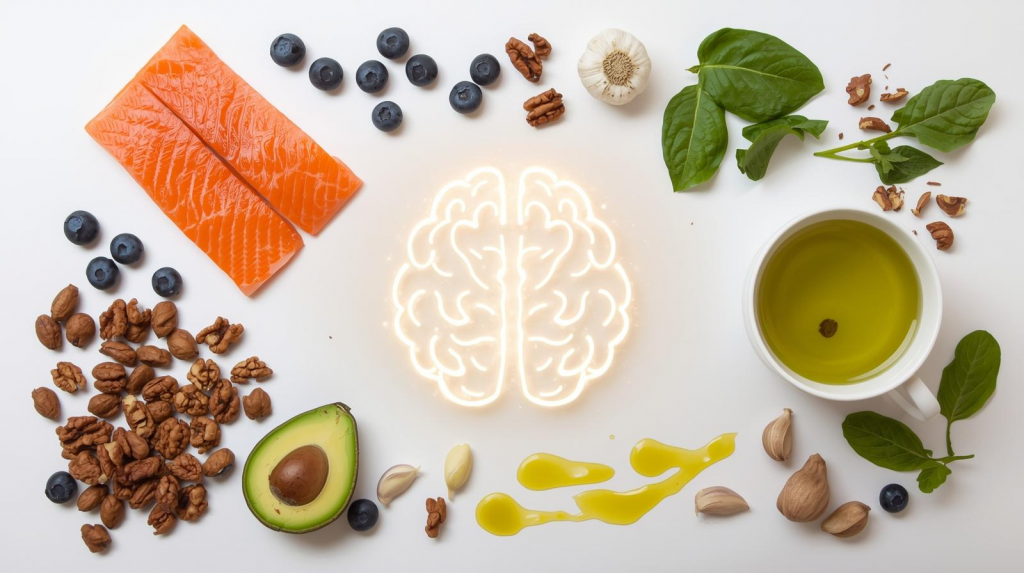
The Impact of Food on the Brain:
How Our Diet Shapes Mental Health and Cognitive Function.

The saying “you are what you eat” is more than a catchy phrase; the food we consume does have a direct impact on our brain health and its function.
“Our most precious gift is our mind,” says memory coach Jim Kwik. To protect that gift, we must fuel it with the right foods. A balanced diet can sharpen memory, improve focus, and lift mood. In addition, it can help protect against long-term decline. While foods like salmon and blueberries often get the spotlight, research shows that the overall diet matters more. In other words, foods work best together, not in isolation.
The Mind’s Nutritional Needs
The mind makes up only 2% of body weight, yet it uses almost 20% of the body’s energy. Because of this, diet quality is critical. Without steady fuel, memory and focus quickly fade.
- Glucose: Whole grains, fruits, and vegetables provide slow energy. As a result, they keep mood and focus steady. However, refined sugars spike blood sugar and then cause a crash (Harvard Health).
- Healthy fats: Omega-3s from salmon, walnuts, and flaxseeds support cell structure. In addition, they reduce inflammation tied to Alzheimer’s (NIH).
- Proteins and amino acids: These are the building blocks for neurotransmitters such as dopamine and serotonin. Therefore, they affect mood, alertness, and motivation. Good sources include eggs, beans, and lean meats.
- Micronutrients: Vitamins B12, C, D, E, plus minerals like zinc and iron, protect memory and support mood balance (Cleveland Clinic).
👉 Related: Protein and Weight Loss
Why Diet Patterns Matter
It is tempting to chase single “superfoods.” However, long-term studies show that diet patterns give stronger results. For example, the Mediterranean, DASH, and Nordic diets all combine vegetables, fruits, nuts, whole grains, fish, and healthy oils. Together, these foods:
- Lower inflammation
- Reduce oxidative stress
- Improve gut balance
As a result, people who follow these diets often show better memory and improved mental health.
The Gut–Mind Connection
In recent years, science has confirmed a two-way link between the gut and the mind. This gut–mind axis affects mood, memory, and even decision-making.
- Mood support: Fermented foods such as kefir, sauerkraut, and yogurt feed healthy microbes. These microbes create serotonin and dopamine, which regulate mood (Harvard Health).
- Inflammation control: On the other hand, processed foods filled with sugar and trans fats upset this balance. As a result, they raise the risk of anxiety and depression. In contrast, fiber-rich foods, olive oil, and leafy greens lower inflammation and support resilience
As Dr. Emeran Mayer notes: “The gut can influence our basic emotions, our pain sensitivity, and even our social interactions.”
👉 Related: Lemon Water Benefits
Foods That Support Memory and Focus
Several foods stand out in research for boosting mental clarity and protecting against decline:
- Leafy greens: Spinach and kale slow aging through antioxidants
- Fatty fish: Salmon and sardines protect memory and reduce plaque in the nervous system
- Berries: Flavonoids in blueberries and strawberries improve recall and slow aging
- Walnuts: Rich in alpha-linolenic acid, they improve blood flow and test scores
- Tea and coffee: Because of caffeine, both improve focus and alertness
- Garlic: Its antioxidants may reduce cell damage and protect memory 👉 Garlic Benefits.
Controversies and Considerations
Although nutrition clearly affects cognition, there are still open questions.
- Mixed results: Some studies show strong effects, while others show weaker links (Frontiers in Nutrition).
- Personal variation: Genetics, gut microbes, age, and lifestyle all influence results. Therefore, one diet may not work equally well for everyone.
- Emerging nutrients: Creatine, vitamin D, and short-chain fatty acids may help, but more trials are needed.
- Supplements vs whole foods: Whole foods provide nutrient synergy. In contrast, supplements work best to correct gaps, not replace meals.
Practical Daily Tips
To improve clarity and focus, small steps often work best.
- Choose colorful fruits and vegetables each day.
- Follow Mediterranean-style patterns for balance.
- Add fermented foods for gut health.
- Stay hydrated for energy and focus.
- Limit processed foods and added sugars.
- Build sustainable habits you can maintain 👉 see Everyday Mastery.
Conclusion
Your diet shapes how you think, feel, and age. In fact, every meal is a chance to protect memory, improve focus, and support long-term health. By eating nutrient-dense foods and following proven diet patterns, you can build a sharper, more resilient mind.
For more insights:
- Dr. Tracey Marks shows how the Mediterranean diet may protect against depression.
- Dr. Andrew Huberman highlights foods that boost focus and recall.
- Jim Kwik shares his favorite foods for memory and learning.
A clear mind is built meal by meal. Therefore, the power to boost mental clarity naturally is already on your plate.
Homosapien Health are also great fans of Jim Kwik he describes his best food suggestions for limited brain power check him Out

Hi, this is a comment.
To get started with moderating, editing, and deleting comments, please visit the Comments screen in the dashboard.
Commenter avatars come from Gravatar.